Yesterday, Alabama Governor Kay Ivey signed into law the Alabama Human Life Protection Act. The law makes performing an abortion at any stage of pregnancy a felony punishable by 10 to 99 years or life in prison for the provider. The women seeking or undergoing abortions wouldn’t be punished, and there is an exception in the law for when the woman’s health is at serious risk.
The passing of this law means that all eyes are on Alabama, as many expect this law to be challenged and taken to the Supreme Court. If it is, the law could possibly be a catalyst for overturning Roe vs. Wade, the ruling that legalized abortion in America. Archbishop Thomas J. Rodi of Mobile, AL stopped by Morning Air® today to discuss Alabama’s abortion ban, and what it shows about the pro-life movement in Alabama and beyond.
Archbishop Rodi pointed out that while many Catholics in Alabama are pro-life, Catholics only make up about 4% of the population, so this bill reflects the diverse, ecumenical support the pro-life movement has in the state of Alabama. He said, “There are many pro-life people in Alabama, more than just Catholics. And to see the vote in the state senate, which was 25-6 in favor of the bill shows just how broad-based it was.”

Many have criticized the law, saying that it goes too far in its restriction of abortion. In response to that criticism, Archbishop Rodi said, “Life is worth protecting. Any life is worth protecting. And the bill makes that clear. Human life is to be honored and respected. You know, abortion is basically based upon two lies, as I see it. One is that the tissue in the womb is just a glob of tissue. And I remember when Roe vs. Wade was first decided, a lot of people actually believed that. But today we’re far more educated. We’ve seen the ultrasounds and we’ve seen that it’s not just a glob of tissue. It’s a baby.”
“The other lie is that the baby is just part of the mother’s body, and a woman has the right to make decisions about her body. And a woman does. But the baby is a distinct human being. A baby has its own DNA and fingerprints. It may be totally dependent on the mother, but it is a distinct human life. And so this bill basically says that the life in the womb is a life. And I don’t think that’s too far.”
A common talking point among pro-choice opponents of the law is that it is an attempt by men to control the bodies and lives of women. However, Archbishop Rodi pointed out that women played an instrumental role in the passage of the bill into law.
“The member of the state legislature who introduced the bill was a woman, and the governor who signed the bill was a woman,” he explained. “And I’ve heard some voices say that this is anti-woman. My personal experience is that the people who are leading the pro-life movement are women. They consider this an issue of life, and it is not in any way anti-woman.”
Alabama isn’t the only state where new abortion bills are being put forward. While New York, Virginia, and Rhode Island have made moves to expand abortion, other states like Georgia, Ohio, and Missouri have moved to restrict or ban it.
When asked what other states can learn from the Alabama abortion law, Archbishop Rodi said, “First of all, I think this reflects that the issue of respect for life, and the issue of abortion is not going to go away. It’s going to have to be discussed by the people of our country.”
“I remember when Roe vs. Wade was first decided there were many people who said, ‘Well, it’s controversial now. But the controversy is going to go away because people are going to get used to abortion and people will just accept it.’ That hasn’t happened. Evil is evil. And this controversy is not going to go away.”
He pointed out that while there has been harsh criticism of Alabama’s abortion ban, it is an opportunity for pro-life Americans to witness to the dignity of all human life.
“The Alabama legislature showed that people are still realizing how wrong abortion is,” he said. “And as we discuss it as a society, I think people become more and more aware of what is happening here. That the life in the womb is being ended. And so I think the important thing about the Alabama legislature is that it brought the discussion back out into the public, and allows people to really reflect on what’s going on.”
Listen to the full conversation with Archbishop Rodi below and join Relevant Radio® in praying for an end to abortion in America. When you do, be sure to add your prayers to our ‘Memorare Meter’. More than 138 million Memorares have been offered for the unborn, and your prayers are making a difference!
Morning Air can be heard weekdays from 7:00 – 9:00 a.m. Eastern/4:00 – 6:00 a.m. Pacific on Relevant Radio and the Relevant Radio App.

